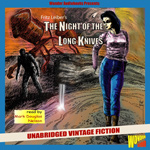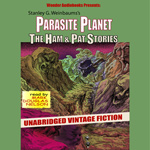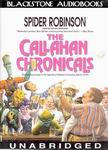
 Little Fuzzy
Little Fuzzy
By H. Beam Piper; read by Jim Roberts
Audible Download – 6 hours 45 mins [UNABRIDGED]
Publisher: Jincin Recordings
Published: 2010
Themes: / science fiction / philosophy / extraterrestrial / sentience
Little Fuzzy is a poor man’s, a thinking man’s, Avatar. It tells the story of a capitalistic corporation exploring a far-off planet with a classical name, Zarathustra. While harvesting the planet’s unobtanium brightly-colored sunstones, prospector Jack Holloway discovers a stange new species, and makes it his life’s work to defend the new creatures. Missing are Avatar‘s flashes, bangs, and rich world-building, but the novel more than compensates with intriguing storytelling that both challenges the mind and touches the heart.
Events in Little Fuzzy take place on the planet Zarathustra. The Chartered Zarathustra Corporation owns the world in all but name, and harvests its resources for trade on the intergalactic market. The world itself is poorly realized. Apart from anti-gravitational devices, hovering cars, and super-advanced CCTV lie detectors, very little in the novel suggests a science fiction setting. Guns, paper, and cigarettes predominate. The novel hints at a rich and storied history of the galaxy with its mentions of the Atomic Era, but these allusions never find ample explanation. The novel does take place in Piper’s Terro-Human Future Universe, however, so readers eager to learn more can probably do so in other novels and short stories.
The major exception to the book’s lack of world-building is the wild flora and fauna on Zarathustra around which Little Fuzzy ultimately hinges. Prospector Jack Holloway finds one of the titular foot-high golden-furred creatures, and soon realizes that the fuzzy fuzzy Holloway Zarathustra (yes, that becomes its official classification) exhibits behavior that may point to sapient consciousness. One of the fuzzies soon meets its demise at the hands of a Zarathustra Corporation agent, and Jack Holloway kills another agent in the ensuing scuffle. The rest of the novel explores the question of consciousness through the narrative framework of a criminal trial. Like the works of Isaac Asimov, Little Fuzzy abounds with cerebral dialogue that, at times, reads like a philosophical proof, but never drones on long enough to become monotonous.
The real show-stopper is Jack Holloway’s emotional connection to his newly-discovered species. At various points he fulfills the roles of teacher, champion, and father to the beleaguered little fuzzies. Thiis emotional power pulls the reader by the heartstring’s through the book’s one or two bare spots to a satisfying conclusion.
Little Fuzzy is also a brilliantly-written novel. Some of the fathers of science fiction appear to take themselves far too seriously, but this certainly can’t be said of H. Beam Piper. While the novel hardly qualifies as a comedy or satire, colorful splashes of humor indicate that, though the book addresses intriguing intellectual issues, at the end of the day Piper is having fun as a writer and a storyteller.
Jim Roberts’s performance of Little Fuzzy for Jincin Recordings won’t win any awards, but his tone fits the mood and content of the novel. His reading is strong enough that even the book’s few tedious passages won’t put the listener to sleep.
Originally published in 1962, just two years before H. Beam Piper’s suicide, Little Fuzzy was written at the zenith of his writing career, and it shows. As a proof-of-concept novel about the nature of consciousness, the book could have easily crossed the line between fiction novel and science lesson, as do some of the other science fiction novels of Piper’s era. Sprightly writing and emotion that almost, but not quite, verges on sentimentality make Little Fuzzy a stand-out novel of its time, and indeed for all ages.
As a footnote, John Scalzi recently announced that he’s written a reboot of the series with the blessing of the Piper estate, dubbed Fuzzy Nation, and that he’s currently shopping it around to publishers. The franchise is certainly in capable hands.
Also be sure to take a look at Jesse’s review of the Audio Realms edition of Little Fuzzy
Posted by Seth Wilson




